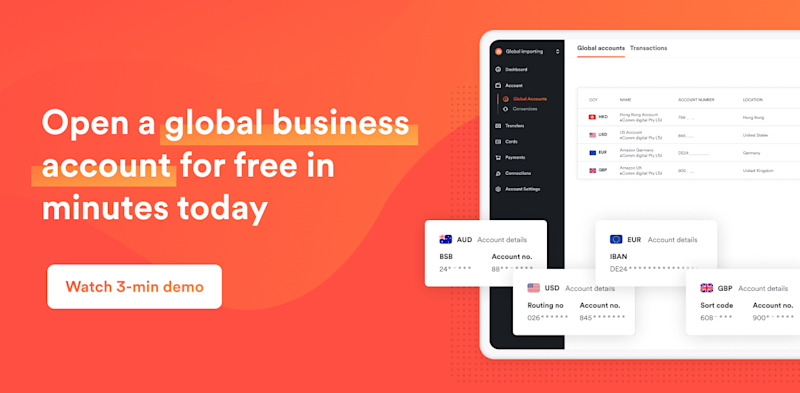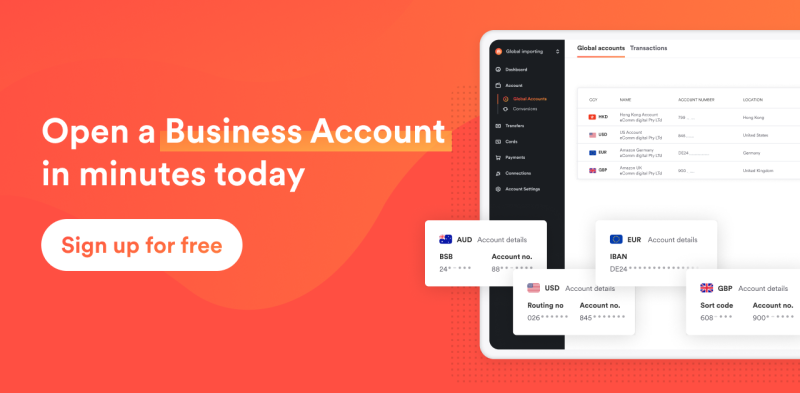Guide to expanding your business to the United Arab Emirates
- •Strategic locations for expansion in the UAE
- •Is the business environment in the UAE ideal?
- •What are the business opportunities in the UAE?
- •Steps and tips for Hong Kong businesses to expand to the UAE
- •Challenges foreign companies may face when starting a business in UAE
- •How can Airwallex help with your expansion to the UAE?
Over the past decade, the significant rise in trade between Hong Kong and the United Arab Emirates has solidified the UAE as a key trading partner for Hong Kong. From 2013 to 2022, this commercial and economic partnership experienced a compound annual growth rate of 5.7% In 2023, Chief Executive John Lee Ka-chiu led a delegation to the UAE, where a significant milestone was reached. The Hong Kong Trade Development Council and the Dubai Chamber of Commerce signed a memorandum of understanding (MoU), committing to strengthen bilateral ties and explore new business opportunities. Furthermore, the Dubai Chamber of Commerce announced the establishment of an international office in Hong Kong to further strength commercial ties. In recent years, the Dubai government has implemented policies such as low tax rates and visa privileges, alongside substantial investments in business infrastructure, thereby creating opportunities for business from Hong Kong and around the world to operate in the region.
Strategic locations for expansion in the UAE
Expanding business operations to the UAE, whether for exports or imports, requires a keen understanding of the local conditions. Start by choosing the right city.
Major cities in UAE
The UAE consists of 7 emirates: Abu Dhabi, Dubai, Sharjah, Ras Al Khaimah, Umm Al Quwain, Fujairah, and Ajman. Dubai, famously known as the “City of Trade” hosts the Dubai Multi Commodities Centre (DCMM) which is the largest and most prestigious free trade zone in the UAE.
What are free trade zones?
To successfully expand your business in the UAE, it is crucial to understand the country’s various jurisdictions. The UAE market is segmented into 3 zones: mainland, free zone, and offshore, and each operates under distinct regulations. Among the three, setting up a company in the Free zone offers several benefits:
Foreign investors can enjoy 100% ownership: Compared to the UAE mainland, free trade zones impose no ownership restrictions. Foreign mainland companies are required to have at least 1 UAE national partner owning at least 51% of the company’s shares, but there is no such requirement in the free trade zone.
Establishing a physical office is not required: There is no mandatory requirement on establishing a physical office; virtual office space can suffice.
Capital and profits can be fully repatriated: Funds and earned income can be transferred abroad without any foreign exchange restrictions.
Highly favorable corporate tax rates: Per the recent regulations by the UAE Ministry of Finance, businesses with annual profits over AED 375,000 (US$102,093) will incur a federal corporate tax of 9%. Those with profits below this threshold remain exempt from taxation.
However, operating in free trade zones comes with specific restrictions, such as limiting the circulation of goods and services within the zone, preventing them from entering local emirate markets. Despite this, the regulations for setting up and operating in free zones are generally more lenient than those in offshore zones, with a typically quicker application process. Hence, free zones continue to be attractive for foreign investors.

Is the business environment in the UAE ideal?
In recent years, the UAE has emerged as a top destination for businesses seeking expansion. It stands first in overall competitiveness in the Middle East and 12th globally, providing a business-friendly atmosphere.
Economic stability
The oil and gas industry has long been the foundation of UAE’s economy. However, the government has actively pursued economic diversification in recent years to reduce reliance on oil revenues. According to the data from the UAE Federal Competitiveness and Statistics Centre (FCSC), the national Gross Domestic Product (GDP) has increased by 3.6% in 2023 compared to the previous year. Notably, the non-oil sector expanded by 6.2%, comprising a significant 74.3% of the total GDP.
Low tax rates
Businesses in the UAE are subject to a 9% federal corporate tax, making it the fifth Gulf Cooperation Council (GCC) country to implement such a tax. However, the UAE's rate remains the lowest among the GCC nations.
Attracting talents
In the 2023 IMD World Talent Ranking, the UAE ranked 22 and leading among the Arab nations. This ranking reflects the country’s favorable conditions in terms of quality of life, wage management, healthcare infrastructure, education, labor force growth, and other key standards.
What are the business opportunities in the UAE?
What industries are growing in the UAE?
In recent years, the UAE has experienced consistent growth in its non-oil sectors, such as wholesale and retail, textiles, automotive and motorcycle repairs, finance and insurance, construction, renewable energy, and tourism. Among these, the local textile industry has surged rapidly, becoming a major contributor to the UAE's income and employment, second only to the oil and gas sector. In 2022, the textile market in the UAE surpassed $10 billion in value, with products being regularly exported to markets in Saudi Arabia, Kuwait, Qatar, Oman, and Bahrain.
Types of goods being exported and imported from UAE/Dubai
As reported by the UAE Ministry of Foreign Affairs, trade relations between the UAE and Hong Kong showed significant growth in 2023 compared to the previous year. Exports rose by 8.9%, imports increased by 17.3%, resulting in ao overall 11% rise in total trade volume.
In the first half of 2024, the UAE stands as Hong Kong’s eighth-largest export market, with exports dominated by textiles, and commodities such as gold, jewelry, tobacco, oil, aluminum, copper wire, printing materials, silver, iron products, and perfumes. As of 2023, the top 3 exports from Hong Kong to the UAE were semi-precious metals (35.8%), non-ferrous metals (35%), and metalliferous ores and metal scrap (18.2%).
For imports, The UAE stands as the 17th largest source for Hong Kong. The 3 leading imported goods include non-metallic mineral manufactures (42.1%), jewelry and semi-precious metals (26.7%), and telecommunications and sound recording and reproducing apparatus and equipment (7.2%).
Furthermore, in early June 2024, the Hong Kong Customs and Excise Department and the UAE’s General Administration of Customs signed the Authorized Economic Operator (AEO) Mutual Recognition Arrangement (MRA) Action Plan. This initiative aims to enhance intelligence sharing, facilitate information exchange, and improve customs clearance efficiency between the two regions.

Steps and tips for Hong Kong businesses to expand to the UAE
Support from HKSAR Government
In recent years, the HKSAR government has launched various initiatives to help businesses expand their operations into the UAE. For example, in 2022, the Trade and Industry Department broadened the scope for Dedicated Fund on Branding, Upgrading and Domestic Sales (BUD Fund) to assist Hong Kong companies in brand development, upgrading, transformation, and marketing expansion into markets in a total of 39 economies including mainland China and other economies with free trade or investment agreements like the UAE. Approved projects under this scheme can receive up to HK$1 million in support.
Also, during the Belt and Road Summit in 2023, the Financial Services and the Treasury Bureau signed a MoU with Dubai’s Department of Economy and Tourism to establish an economic corridor. This initiative aims to enhance policy communication, knowledge exchange, and cooperation in key areas of the financial services industry between the two regions. The collaboration covers family offices, financial technology, virtual assets, green and sustainable finance, and more.
Support from UAE Government
The UAE stands as the leading hub for startups in the Middle East. According to Forbes's list of Middle East's Top 50 Most-Funded Startups 2022, the UAE attracted 60% of the total startup investments. The local government has actively fostered a business environment conducive to startups, encouraging entrepreneurship by introducing numerous incentives and programs.
One notable initiative is the announcement of "Chief Innovation Officers" across various government departments to spearhead the country’s innovation strategies. Furthermore, the UAE has established significant support systems, such as the $270 million Khalifa Fund, the Dubai Future Foundation, and the Dubai Future Accelerators program, to encourage entrepreneurial ventures.
Also, in order to nurture a sustainable startup ecosystem, the UAE offers 5-year residency visas to entrepreneurs. Applicants must meet specific criteria, such as owning a company valued at a minimum of AE 500,000 (approximately US $136,000) or having a project recognised by the country for its technological and forward-thinking characteristics.

Steps to start a business in the UAE
1. Determine the nature of your business activity:
Consider the feasibility and profitability of expanding into the UAE market.
2. Choose a jurisdiction:
The UAE market is divided into mainland, free trade, and offshore economic zones, each with different legal regulations for businesses. You should choose the jurisdiction based on your company background, business activities, and needs.
3. Determine your business's legal structure: Choosing a legal form is a crucial decision for a business as it governs how profits, losses, and resources are managed.
For establishing your company in the UAE mainland, you can choose from the following legal structure:
Sole establishment
Branch of a GCC company
Civil company
Branch of a local company
Limited liability company
Holding company
Public joint stock company
Representative office of a foreign company
Private joint stock company
For establishing your company in the UAE freezone, you can choose from the following legal structure:
Free Zone Limited Liability Company (FZ LLC)
Free Zone Company (FZ Co.)
Free Zone Establishment (FZE)
4. Register the trade name and apply for approval
Before establishing a company in the UAE mainland, you must obtain approval for your trade name and chosen business activities from the Department of Economic Development (DED). Once granted, you can proceed to submit the necessary documents for a UAE trade license and start establishing your company in Dubai.
5. Apply for a trade license
There are 6 types of licenses, namely industrial license, commercial license, crafts license, tourism license, agricultural license, and professional license. You can choose the one that suits your business.
6. Register your company
Company registration and licensing are simultaneous processes that require obtaining approvals from relevant government entities according to the DED guidelines. The required documentation varies depending on the company type and activity. For instance, some businesses might need approvals from municipal authorities, certain banks, embassies, and more.
7. Choose your business location
Based on your business needs, you can consider renting office units or shared workspaces. The type of office space affects the number of visas you can apply for with the DED.
8. Obtain EJari
Ejari is an online system of the Real Estate Regulatory Agency (RERA) where you need to submit your lease contract and other documents to activate your Ejari account. Ejari is crucial as you require it to apply for visas for your family members or employees.
9. Apply for visa
This process consists of four simple stages.
Entry permit application
Status adjustment
Medical and fitness tests
UAE ID registration and visa stamping
10. Apply for trade license
To apply for a UAE trade license, you need to submit the following documents:
Memorandum of Association (MoA)
Trade license application
Relevant government forms
Trade name reservation certificate
Receipt of Initial approvals
External approvals (if applicable)
Lease contract
Ejari registration certificate
Passport copies of partners
Partner's No Objection Certificate (NOC) (if applicable)
Any other requirements from DED (if applicable)
11. Open a business bank account
Opening a bank account for your company is crucial for managing corporate finances. Alternatively, you can choose to open a free online Airwallex Global Business Account, which bypasses the complex application process of traditional banks.

Challenges foreign companies may face when starting a business in UAE
Foreign businesses operating in the UAE typical face the following challenges:
Lack of preferred payment options for customers
When doing business internationally, failing to offer local customers their preferred payment methods can greatly affect sales. A study by Airwallex and Edgar, Dunn & Company reveals that up to 77% of global consumers surveyed might abandon their shopping carts if they cannot use their preferred payment options.
High foreign exchange costs
Whether you are looking to export products to the UAE or import goods from UAE-based companies, using the local currency (AED) can incur significant foreign exchange fees, gradually diminishing your profits. Payments to international suppliers through wire transfers or money changers can take up to five business days, impacting your cash flow. Such delays in payment may also affect partnerships with suppliers.
Currency conversion fees
Transacting in AED with local customers or suppliers maye result in currency exchange fees each time. In addition to exchange rate fluctuations, these transactions incur conversion costs.
How can Airwallex help with your expansion to the UAE?
1. Global Account: Collect payments without incurring currency conversion fees
Open your account with a dedicated AED account and branch code online from anywhere, anytime. Start receiving payments from local customers in AED, with funds directly deposited into your account, thus avoiding currency exchange. You can also pay your suppliers in AED from account balance whenever needed, saving on unnecessary foreign exchange expenses and avoiding hidden fees. Additionally, our Global Account offers competitive rates, allowing you to mitigate risks related to exchange rate fluctuations due to local policies and market demands.
2. Dedicated eCommerce plugins: Access 160+ payment methods
Whether your online store is on a self-hosted platform or through popular eCommerce sites like Shopify or WooCommerce, integrating the Airwallex payment platform is a breeze with our plugins.
You can effortlessly access over 160 local payment options without any coding. With Airwallex, you can offer your customers a range of popular payment methods, including major credit cards, WeChat Pay, AliPay, and e-wallets, along with "buy now, pay later” options like Klarna and Afterpay. This diverse selection enhances customer choices, lowers payment barriers, and boosts sales and profits with ease.
3. Local payment network: $0 overseas transaction fees
Over 90% of payments are processed via Airwallex’s local payment networks. You can transfer funds without incurring overseas transaction fees across local networks in over 110 countries, reducing transfer times with funds credited as quickly as the same day.
Open a free Airwallex Global Business Account today, completing the process online in just 30 minutes. With no account opening or monthly fees, Airwallex is the perfect solution to seamlessly prepare for your expansion into the UAE.
Sources:
Information was retrieved as of Sep 2024, from below sources. Information provided is for reference only. Please refer to the official websites for the most up-to-date details.
https://research.hktdc.com/tc/article/OTc5OTgzMTkz
https://research.hktdc.com/tc/article/MTcxNzY4MDc1OA
https://www.wam.ae/zh/article/b3ewmwh-阿联酋经济稳步增长-gdp实际增速位居全球第五
https://research.hktdc.com/tc/article/MTY1ODMyNDAyMg
https://www.mofa.gov.ae/zh-TW/Missions/Hong-Kong/UAE-Relationships/Economic-Cooperation
http://m.ce.cn/bwzg/202408/28/t20240828_39119172.shtml
https://research.hktdc.com/tc/article/MTczMTU3MjA2Ng
https://www.shuraa.com/zh-TW/how-to-start-a-business-in-dubai-uae/
Share

Kirstie Lau is a fintech writer at Airwallex, and has built up a wealth of knowledge in financial operations systems. In her day-to-day, she dedicates herself to crafting content that fits the unique needs of businesses seeking financial operations solutions. Kirstie’s background in analytics and product marketing gives her a unique perspective on guiding businesses through the complex world of payments.
View this article in another region:Hong Kong SAR - 繁體中文

